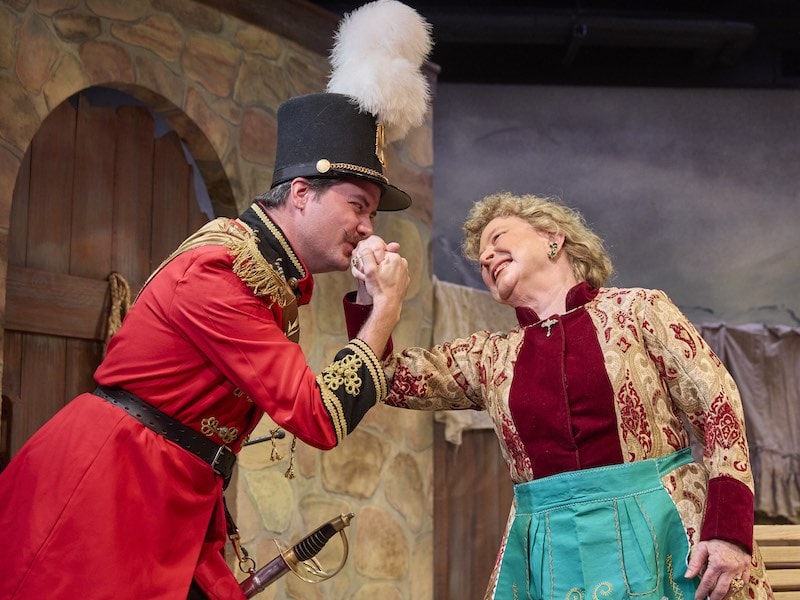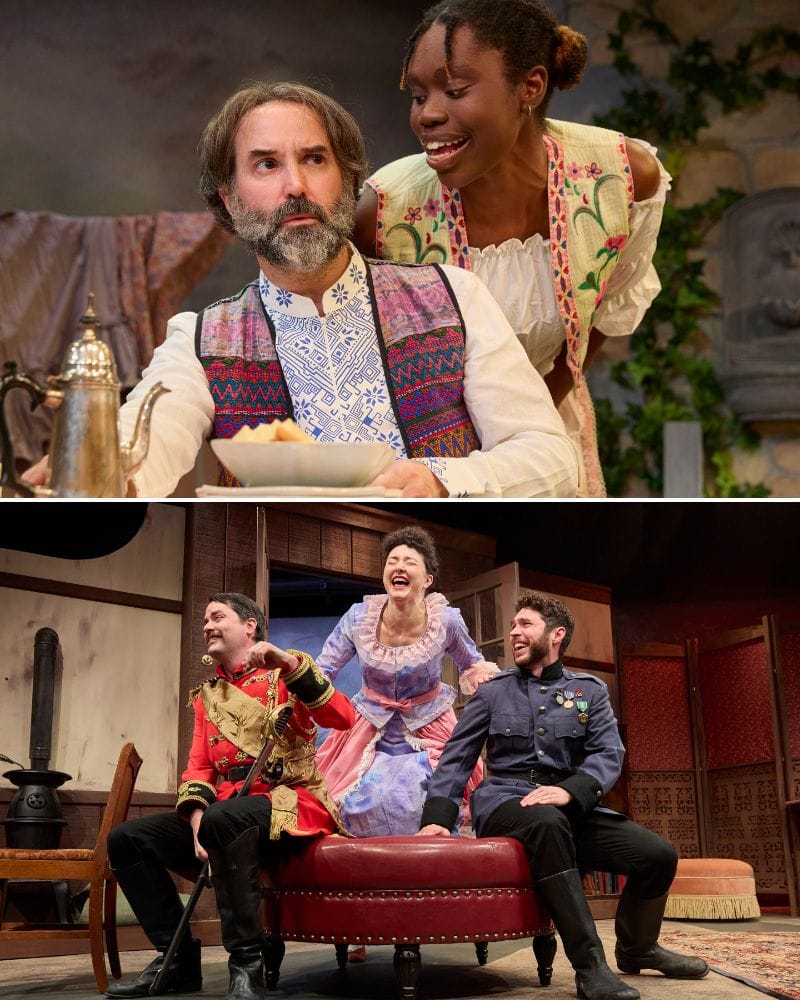The 1890s were prime time for excellent British comedies, among them Charley’s Aunt, The Importance of Being Earnest, and George Bernard Shaw’s Arms and the Man, the latter now in a delightful production by the Washington Stage Guild (WSG). The play takes witty aim at class distinctions and military pomposity, wrapped in a plot that any rom-com screenwriter could envy.
Raina Petkoff (Em Whitworth), daughter of a prominent Bulgarian family, awaits the return from a war with Serbia of her cavalry officer fiancé, Sergius Saranoff (Thomas Daniels). In a variation on the typical meet-cute, her breathless anticipation of reunion with her gallant hero is interrupted by Captain Bluntschli (Zack Powell), a Serbian army officer on the run from Bulgarian forces, who climbs up a drainpipe into her bedroom. Despite being exceedingly tired and nerve-wracked from three days of combat, he charms Raina and her mother, Catherine (Lynn Steinmetz), who help him hide and escape. A professional soldier with no illusions about heroism or the romance of battle, Bluntschli prefers carrying chocolate to bullets in his uniform pockets. Raina dubs him her “chocolate cream soldier.”

The war soon being over, Sergius and Raina’s father, Paul Petkoff (Matty Griffiths), return home, attended by servants Louka (Diana Afriye-Opoku) and Nicola (Nick DePinto). Then Bluntschli — who is in fact Swiss — arrives, jump-starting the machinations that ultimately lead everyone to wind up with the partner best fitting their character.
An important reason the play continues to work after 130 years is that Shaw gives unexpected sides to characters who at first can seem to be types. Sergius, a strutting military popinjay who emphasizes his unwavering resolve with crossed arms and frequent whacks on his boots with a riding crop, nevertheless has quieter moments of self-awareness. Daniels navigates nicely the frequent back-and-forth transitions in Sergius’ character.
Everybody ought to have a maid like Louka, a clever, energetic girl who sees clearly what is going on among all the upstairs and downstairs characters. Insisting, contrary to Nicola’s belief, that her soul is more than that of a servant, Louka, in Afriye-Opoku’s portrayal, is often angry about her status, slamming down a platter here and there, openly in conflict with Sergius at times, while also rationally planning for social mobility.
Catherine, as far as her husband can tell a traditional wife, not only rules the household but can improvise at an instant’s notice to handle any awkward situation. Steinmetz gives something of a master class in the use of specific, often subtle, hand gestures to command the stage on multiple occasions.

The head-in-the-clouds romanticism of many of Raina’s lines seems fitting for the girl of 17 Bluntschli initially thinks her to be. Whitworth’s highly articulate and collected take on the character often felt more emotionally mature than someone who would pass as a teenager to someone as generally perceptive as Bluntschli. Whitworth’s performance also underlines the essential kindness of Raina’s character.
Powell’s Bluntschi, while seemingly not as exhausted in his first scene as his lines suggest, hits all the right notes of cynicism about war and respect for competence that Shaw intended, though a touch more of world-weariness might have enriched the performance. His ultimate bond with Raina is based, as much as anything, on his taking her seriously and her acceptance of that seriousness about herself.
In more one-dimensional roles, Griffiths and DePinto effectively sketched, respectively, a gruff, kindly, blinkered, old-school father and a man whose vision is limited to his role as a servant, shown by his submissive physicality while in the presence of his betters.
Michael Rothhaar’s direction kept the pace lively and the comic lines and bits precisely timed, creating a highly entertaining performance. The production kept a fine balance between light comedy and the more serious themes underlying it.
Arms and the Man is a three-act play, and set designer Joseph B. Musumeci Jr. created a separate set for each act: Raina’s bedroom, the Petkoffs’ courtyard, and the estate’s library. All effectively pictured the scene involved. A well-painted mountain backdrop appeared in all three scenes, and there were nice detail-level touches, such as the clothesline in Act Two and the amusingly sparse collection of volumes on the bookshelf in Act Three. Cheryl Yancey provided a colorful array of costumes for the characters, not least the bright reds for the uniforms of Sergius and Paul, Raina’s pastel dress, and the bare-shouldered folk-costume-like dress for Louka.
The November 1885 Serbo-Bulgarian war, which forms the background of the play, was by military standards a trifling thing, lasting about two weeks before adjacent major powers (Russia and the Austro-Hungarian and Ottoman empires) brought pressure on the belligerents to settle their quarrel. It could easily be seen as a comic interlude by UK audiences, and Shaw did not waste the opportunity to poke fun at the silly provincials involved (e.g., Bulgarians being reluctant to wash their hands more than once a week). As the following decades would show, chronic turmoil in the Balkans was no laughing matter.
In his masterful study of the British literature of World War I, The Great War and Modern Memory, Paul Fussell commented that no one in the summer of 1914 would have understood the hollowness of such abstract words as glory, honor, and courage. Fussell to the contrary, it seems clear that 20 years before the Great War, Shaw understood the point perfectly well. The serious fun he made of it in Arms and the Man, as well as the often sweet comedy among the characters, shine through in WSG’s production.
Running Time: Two hours and 20 minutes, including two intermissions.
Arms and the Man plays through December 10, 2023, presented by Washington Stage Guild performing in The Undercroft Theatre at Mount Vernon Place United Methodist Church, 900 Massachusetts Avenue NW, Washington, DC. Prices are $50 for Thursday evening performances and Saturday and Sunday matinees, and $60 for Saturday and Sunday evenings. Students are half-price, and seniors over 65 get a $10 discount. Tickets can be purchased online.
COVID Safety: Masks are strongly recommended (not required). Washington Stage Guild’s complete Health and Safety Policy is here.




